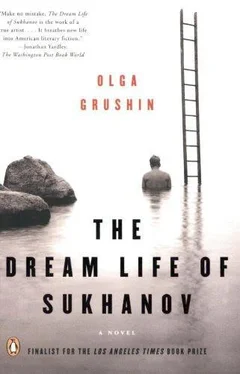“Spiritual content?” Sukhanov repeated with derision. “Is that what you call spirit, then—a dark tangle of superstitious clichés robed in centuries of random symbols and served up on an elaborately jeweled platter for peasants’ consumption?”
“And what do you call spirit, if I may ask—now that you’ve so neatly disposed of every world religion, and all in a dozen words?” said Dalevich, smiling.
“The eternal human striving to attain new heights,” said Sukhanov without hesitation.
“By which you mean, no doubt, various cultural developments ultimately designed to facilitate the advent of bigger factories and happier family units?” asked Dalevich amiably. “That is, after all, what you people preach—useful art in service of a Great Tomorrow? And by the way, have you ever considered that your socialist realism and my religious painting have much in common—indeed, the one may be said to be a logical, if sadly impoverished, continuation of the other. Both have deep communal roots, and both serve a noble purpose—the good of the people or the salvation of all mankind, as the case may be. In both, too, the painter is an anonymous teacher of sorts, a compassionate man with a holy mission to educate, to enlighten, to show the way—a very Russian idea of the artist in general, don’t you find, so unlike the Western type of a solitary dreamer engaged in a private game of self-glorification. And of course, both socialist realism and icon painting are concerned with an ideal, visionary future, except that yours is strictly material, an earthly paradise of your own devising, so to speak, while mine—”
“What in the devil’s name does socialist realism have to do with it?” interrupted Sukhanov. “I’m talking about art! Art is not about some common purpose or noble mission. It’s an expression of an artist’s soul, his individual, titanic struggle to rise above the ordinary, to speak a word unheard before, to extract an unexpected, mysterious, radiant nugget of beauty from the many obscure layers of our existence, to glimpse a bit of the infinite in everyday life—and truly great art comes to us like an ecstatic revelation, it sets our whole being on fire! And your medieval wall-painters were nothing but practitioners of applied arts, obedient illustrators of a few stale, commonplace truths about a small man’s eternity. Crushed by the weight of their own credo ‘Blessed are the poor in spirit,’ they never took risks, never overstepped their boundaries, never tried to set vibrating some new, previously untouched chord in our souls—”
He stopped, short of breath, surprised by the sudden passion that had made his voice ring, caught off guard by an overwhelming desire that, awakening all at once, claimed his whole being—a desire to break the silence of so many years, to release his innermost thoughts on the subject once closest to his heart—and to be understood. His cousin, he noticed, was looking at him with something nearing astonishment, a slice of apple forgotten on its way to his beard. A broadening hush slowly ate into the air like a spreading stain into a piece of cloth. Finally Dalevich blinked, put the slice of apple back on the saucer, and clapped with weighty, theatrical cheer.
“Bravo, Tolya!” he exclaimed. “Spoken like an artist, not a critic—and certainly not a critic from Art of the World! Still, for all your eloquence, I could never share your disdain for, what do you call them, ‘boundaries.’ I agree that art should be about striving, but I believe it is precisely by striving within its boundaries that art can achieve its highest peaks. An artist of true genius is not one who wholly dis misses old traditions and plunges us headfirst into an unknown, disorienting, possibly meaningless paradigm, but rather one who, working from within a predetermined framework, subtly manages to push away our blinders an inch or two, to reflect our faces in a mildly distorted mirror, to find a second bottom in the most familiar things or a second meaning in the most exhausted words—in short, to wipe the accumulations of dust from our world—and who by doing so allows us to rise with him to a higher plane of existence. That is why Chagall, with his deceptively simple, childlike universe of flying fiddlers, green-faced lovers, and mysteriously smiling cows, will always be greater than Kandinsky, with his icy swirls of color and elegant abstract compositions, for all the brilliant innovations of the latter.”
“A dubious argument,” said Sukhanov thoughtfully. “Isn’t it paradoxical to argue that artists who make tiny steps are greater than those who make giant strides?”
“Personally, I find paradoxes refreshing, especially when… Heavens, is it really ten o‘clock? I’m afraid, Tolya, we’ll have to continue our discussion some other time—I have to pay a visit to an acquaintance, he’s helping me with my research…. Or better yet, why don’t you come with me? Oleg has a splendid collection of icons. Come, you two can talk about medieval art to your hearts’ content. What do you say, eh?”
Sukhanov had planned to spend all day at his desk, as the ill-fated Dalí article was due the next morning and he had written nothing beyond the first sentence.
“Ah, why not,” he said lightly, brushing crumbs off his lap. “I have some time to kill.”
Summer seemed to have tiptoed out of Moscow while no one was looking. In the gray, diffused light of a gloomy autumnal day, the streets of the Zamoskvorechie were drab and unwelcoming. The wind drove along the pavements a procession of yellowing leaves and, mixed in among them, ice cream wrappers and an occasional newspaper page.
Dalevich trotted alongside Sukhanov, talking in his mild, persuasive voice. “One could go even further,” he was saying, “and argue that repression ultimately benefits the arts. By the way, your Dali held precisely that view. Take a man with a mustache, for instance—nothing interesting under ordinary circumstances, wouldn’t you agree?”
“Er… yes,” said Sukhanov, not listening. A stray playbill leapt out of nowhere and flattened itself against his trouser leg. He bent to pick it up, scanned it without curiosity (Dead Souls, at the Malyi Theater—a mangled remnant of someone’s long-past evening from the last theater season), then released it. The bill danced frenziedly across the road.
“Yes, but if some tyrant bans all facial hair, an ingenious person might contrive to grow a secret mustache, say, around his ankle, and that would be interesting, no? So in a way, you see, imposing limits on creativity may actually stimulate the appearance of better, or at least more innovative, art. Of course, in Russia, boundaries and rules—whether set by the Church, the tsar, or the Party—have always been an integral part of any artistic endeavor, and this may account—”
“Are we getting close now?” Sukhanov interrupted. For the past few minutes he had been asking himself with growing befuddlement why on earth he had agreed to visit a total stranger—an icon collector, of all things—on this busy, this extremely busy day.
“Almost there,” said Dalevich brightly. “Just through this gateway and across the yard. Anyway, as I was saying, this may account in part for the astonishing regularity with which our land has given birth to geniuses. Although, to be honest, the last five or six decades—”
A low archway in a nondescript wall led them from the bustle of Bolshaya Ordynka onto a narrow path twittering with invisible birds. A peeling one-story house, almost a shed, stretched on their right; on their left rose a toylike church, half concealed by tall purple-headed wildflowers swaying in the wind. Sukhanov paused in surprise. He had hurried with crowds on the other side of the wall scores of times and yet had never suspected the existence of this quiet little nook, shady, damp, and melancholy like some tenderly heartrending watercolor by Levitan—but of course, Moscow was full of such forgotten, crumbling corners, exiled reminders of a different life.
Читать дальше








![Theresa Cheung - The Dream Dictionary from A to Z [Revised edition] - The Ultimate A–Z to Interpret the Secrets of Your Dreams](/books/692092/theresa-cheung-the-dream-dictionary-from-a-to-z-r-thumb.webp)



